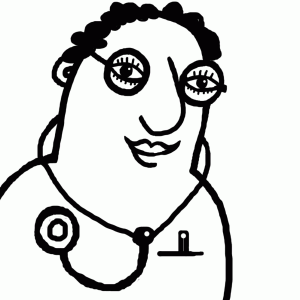You and your doctor
 A good relationship with your doctor and health workers can help your health in the long term.
A good relationship with your doctor and health workers can help your health in the long term.
As well as your doctor, nurses and pharmacists can give you support and advice. This includes on adherence and side effects.
They can make referrals to other professionals, including dieticians, psychologists and social workers.
Both you and those involved in your care have certain rights and responsibilities. The following lists include some of your rights and responsibilities as a patient.
Your rights as a patient
- To be fully involved in all decisions about your treatment and care.
- To be seen within 30 minutes of your appointment. If they are running late,you should expect an explanation.
- To be treated with respect and confidentiality.
- To have different options for treatment explained to you. This should include the risks and benefits of each option.
- To have your doctor or nurse explain any test results.
- For your records to be kept securely. They should be available for you to see if you ask.
- To choose whether to take part in research trials. This will not affect your current and future care.
- To make a complaint about your treatment. Any complaint must be fully investigated. Again, this should not affect your future care.
- To have a second opinion from a suitably qualified doctor.
- If you write to your hospital or clinic, you should have a writtenresponse within 14-28 days.
- To change your doctor or treatment centre without it affecting your future care. You do not have to give a reason for changing doctors or clinics. However, if there has been a misunderstanding, then giving a reason can sometimes help resolve the problem.
- To have test results and a summary of your treatment history forwarded to your new doctor or clinic.
I was confused about how my clinic worked, even when I was on treatment. One day I asked the nurse to explain the tests and what a ‘good’ or ‘bad’ result might mean.
It was tremendously helpful. I used to be happy with doctors saying ‘everything’s okay’ but now I want to know details about a few key things — my cholesterol, my bone health, my liver and kidneys.
— Matt, Brighton
Things you can do to help
- Find a clinic that is convenient to you and that you feel comfortable with.
- Find a doctor who you like. If you are a woman and want to see a female doctor then ask for this.
- If you are a gay man and want to see a gay doctor, this might be available and might influence your choice of hospital.
- Turn up for your appointments on time. Tell the clinic if you can’t make it. Then they can give your slot to another patient.
- Make a list of things you want to discuss with your doctor. Remember to take it to your appointment!
- Ask to see the same doctor at each visit. This is important. It’s difficult to develop a good relationship if you always see a different doctor. Once you are more settled, the advantages of sometimes seeing a different doctor include getting a second opinion and perspective.
- Have your routine bloods taken 2-3 weeks before your regular clinic visits so the results are ready for your appointment.
- Treat all people involved in your care with the same respect you would wish to receive yourself.
- Listen carefully to the health advice that you are given, and act upon it.
- If you don’t understand something, ask your doctor to explain it again or in a different way.
- Be honest with those caring for you. Tell them about any other drugs that you are taking. This includes legal and illegal drugs or complementary treatment.
- Be honest about your level of adherence. If the people managing your care don’t know you are having problems, they can’t help.
Getting your doctor to help…
Many of us underestimate side effects when we talk to our doctor.
- We don’t like to make a fuss.
- We say they are more manageable than they really are.
- Sometimes we even forget to mention them at all.
Unfortunately, some doctors think that we overestimate side effects.
- They think people exaggerate side effects, and that they are not really as bad as we say.
This means there can be a big difference between what is actually going on and what your doctor thinks is going on.
This is one reason that side effects are often under treated.
Talk to your doctor about any problems. This should not be about how you feel on the day you see you doctor, but about how you feel on days you get side effects.
If you don’t say something, nothing will change.
Last updated: 1 November 2021.
